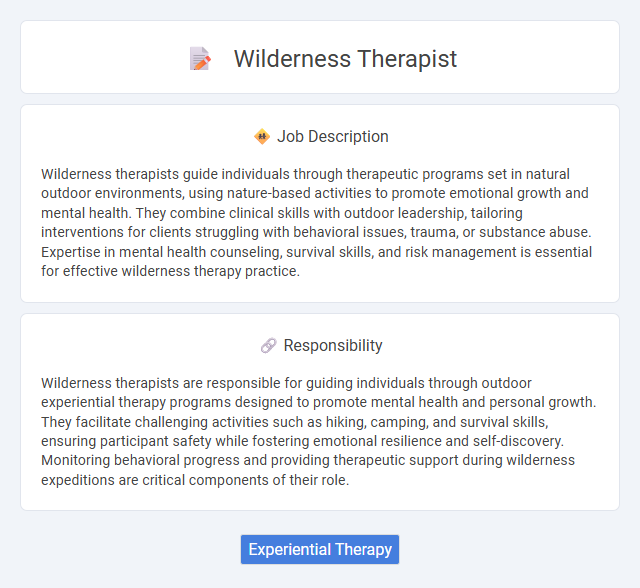
Wilderness therapists guide individuals through therapeutic programs set in natural outdoor environments, using nature-based activities to promote emotional growth and mental health. They combine clinical skills with outdoor leadership, tailoring interventions for clients struggling with behavioral issues, trauma, or substance abuse. Expertise in mental health counseling, survival skills, and risk management is essential for effective wilderness therapy practice.
Wilderness therapist roles likely suit individuals who are emotionally resilient, adaptable, and passionate about outdoor environments, as the job often involves supporting clients struggling with mental health or behavioral challenges in remote settings. Those who thrive may have strong communication skills and the ability to remain calm under pressure, while people with limited patience or discomfort in unpredictable, rugged conditions might find it difficult to succeed. The suitability depends on one's physical endurance, empathy, and commitment to helping others navigate personal growth through nature-based therapy.
Qualification
Wilderness therapists typically require a bachelor's degree in psychology, counseling, social work, or a related field, often supplemented by certifications in wilderness first aid and outdoor leadership. Relevant experience in outdoor education, mental health, or therapeutic settings enhances qualifications, along with knowledge of crisis intervention and adolescent development. Many employers prefer candidates with licensure or credentials as licensed professional counselors (LPC) or licensed clinical social workers (LCSW) to ensure clinical competence in therapeutic practices.
Responsibility
Wilderness therapists are responsible for guiding individuals through outdoor experiential therapy programs designed to promote mental health and personal growth. They facilitate challenging activities such as hiking, camping, and survival skills, ensuring participant safety while fostering emotional resilience and self-discovery. Monitoring behavioral progress and providing therapeutic support during wilderness expeditions are critical components of their role.
Benefit
Wilderness therapist jobs likely offer significant benefits such as improved mental health and personal growth through immersive nature experiences. Participants in these programs may experience increased resilience, self-awareness, and emotional regulation. The role potentially provides a unique opportunity to foster healing in a natural, distraction-free environment.
Challenge
A wilderness therapist job likely presents significant challenges due to the unpredictable outdoor environment and the complexity of addressing clients' emotional and behavioral needs in remote settings. It probably demands strong problem-solving skills, resilience, and adaptability to navigate both physical obstacles and therapeutic dynamics. The role may require balancing safety concerns while fostering personal growth, which can be mentally and physically demanding.
Career Advancement
Wilderness therapist careers offer unique opportunities for advancement through specialized certifications in clinical counseling and outdoor leadership. Professionals gain experience by leading therapeutic expeditions and managing program development, which can lead to supervisory or director positions within treatment centers. Pursuing advanced degrees in psychology or social work further enhances prospects for leadership roles and higher compensation in the wilderness therapy field.
Key Terms
Experiential Therapy
Wilderness therapists use experiential therapy techniques to engage clients in outdoor activities that promote emotional growth, self-awareness, and behavioral change. This therapeutic approach leverages challenges in natural settings to develop problem-solving skills, resilience, and interpersonal communication. Certified wilderness therapists often work with individuals facing mental health issues, trauma, or substance abuse by integrating adventure therapy principles with clinical counseling methods.
 kuljobs.com
kuljobs.com